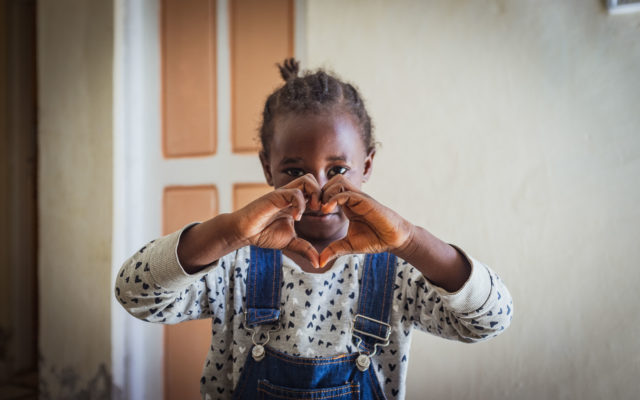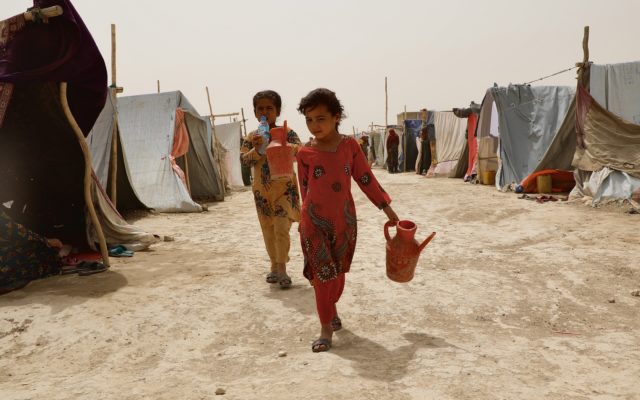“You will hear a similar story from every Afghan you speak to.”
Sveto Muhammed Ishoq shares her story so far, and her hopes for the future.
© Sveto Muhammad Ishoq
UK for UNHCR spoke to Afghan student and women’s rights activist Sveto Muhammad Ishoq (Sveta) about her journey. From moving to six different countries to challenging stereotypes about Afghan women and girls whilst advocating for women’s rights in Afghanistan, Sveta has an important message for the world when it comes to welcoming refugees.

Sveto Muhammad Ishoq
I was born in the war-torn city of Kunduz, Afghanistan. As the youngest of five siblings, I’m the one that everyone takes care of.
Two of my siblings live in the UK and have happy lives with their children. They’ve made the UK their home, and they’ve been accepted into their respective communities. I have recently moved to the UK and already feel like I can call the UK my second home.
Still, part of me misses Afghanistan, especially during this challenging time. It’s important to remember that we were forced to leave our home, we did not want to.
What was initially one move resulted in living in six different countries. Every time I went to a new country, we had to start from scratch, making new friends and learning new languages and cultures. I’m sure you will hear a similar story from every Afghan you speak to.
The first time we were forced to flee was when I was six months old. We moved from Afghanistan to Tajikistan, where we stayed until I was in year four, before moving to Kazakhstan. Once in Kazakhstan, we stayed there until I was in year nine, but with the situation improving in Afghanistan, we were able to return home.
After returning home I was able to finish my schooling there, before going to do my Undergraduate degree in Business Administration at the American University of Afghanistan.
Upon my return to Afghanistan, I was greatly amazed by the resiliency of Afghan women. Witnessing the strength of Afghan women to persevere against such significant challenges fuelled my passion and purpose in life. The first Afghan super-woman I looked up to was my aunt. Every morning, my aunt leaves her home to provide for her six children and husband. I learned quickly that experiences like my aunt’s are not unique; they are common for thousands of women across Afghanistan. I watched Afghan women bear the burden of caretaking, providing and leading in their communities without access to adequate support. That’s when I decided to advocate for women’s rights in Afghanistan.
My advocacy journey began in high school when I started writing for local papers and international outlets, including the Interstellar Bulletin and the Afghan Women’s Writing Project (AWWP), about women’s problems in Afghanistan. I started volunteering for national and international organisations furthering the fight for women’s rights in Afghanistan. At AWWP, I worked with Afghan women from all the 34 provinces of Afghanistan, teaching writing skills and publishing their work. I also joined the Everywoman Treaty as a Program Support Leader, working on the first-ever global international treaty on violence against women.
Through working with different women’s rights organisations, I realised one of the most challenging problems for women’s rights in Afghanistan— and in many other parts of the world— is financial dependence on men. This inspired me to use my business background and passion for community work to launch a social enterprise creating jobs for Afghan women. In 2018, I created Ayat, Afghanistan’s first clothing brand to provide quality modest clothing at fair prices. The aim is to empower Afghan women through fashion and provision of job opportunities.

This interest in social enterprise work took me to China when I became Afghanistan’s first Schwarzman Scholar, where I had the opportunity to study my first Masters in Global Affairs at Tsinghua University. It also gave me an opportunity to be able to travel out of choice, rather than necessity. It became one of the most challenging experiences of my life, yet very rewarding.
There, I started to realise how people perceived my country and my people. The ‘single’ story people had in their minds about Afghanistan, Afghan women and life in Afghanistan in general. The conversations would start with the war, the Taliban, and child marriages. It would hurt a lot that people only knew one side of my country, shaped by the media. But I did not blame them as I was probably the first Afghan they ever met.
I started to tell people about ‘my’ Afghanistan. I talked about how my Undergraduate university, the American University of Afghanistan, was attacked by the Taliban on August 24th, 2016, how I tragically lost classmates. The University was closed for 7 months. But I also told them about the reopening, my brave classmates who came back to the school to continue education.
I showed people the rich history and culture of our Afghanistan National Treasures exhibition in the Tsinghua Art Museum. I told them about the important role Afghanistan has played in connecting the East and West throughout history, and that we have 5000+ years history.
My experience in China helped me shape my values. By being there, I realised that it was important to share how there is so much more to Afghan women than what is portrayed in the media, but also how important it was to fight for women’s rights in Afghanistan.
After this, I moved back to Afghanistan, full of passion to contribute the skills I gained in China for the betterment of the country. My family and I were planning to stay in Afghanistan, but with the upcoming 2019 elections, trouble started brewing, forcing us to move again.
From Afghanistan, we went to Kyrgyzstan, another country I’d never been to before. Again, we had to start from scratch. Despite COVID-19 and the challenges of moving to another country, I decided to continue my activism. I founded Chadari, with the mission to dispel the stereotypes that surround the diverse experiences of Afghan women through highlighting the stories of women and girls from a diverse set of backgrounds. Chadari is an initiative that focuses on education and the empowerment of women and girls, whilst promoting women’s rights in Afghanistan. Meaning ‘blue burqa’ in Dari, Chadari’s mission is to highlight how all Afghan women are powerful, brave, and have amazing stories to share with the world.
Whilst in Kyrgyzstan, I also made the decision to do a second Masters. As I had family in the UK, I decided to come here. I applied for a Masters program at the London School of Economics and Political Science, receiving a full scholarship to complete my Gender, Development and Globalisation degree.
Currently, there is so much going on back home, and it’s easy to feel helpless. When I was in the process of applying for the UK visa, when Afghanistan collapsed – it was the most heart-breaking experience of my life. I almost gave up and did not want to come to the UK to continue my studies, but I decided to keep going despite the darkness.
Despite these feelings of helplessness, I’m organising two conferences at LSE that will focus on issues relating to Afghanistan next semester. I’m still so heartened and appreciative of how accepting people in the UK have been, and also how diverse my new city is!
To the people of the UK, I ask you to continue to show kindness to refugees, because it can make a massive difference in our lives. Small acts such as smiling or being welcoming mean so much to us. What refugees are going through is not easy at all, we must face a lot of obstacles on our journeys.
______________________________
As Sveta said, “You will hear a similar story from every Afghan you speak to.”
The humanitarian needs in Afghanistan continue to grow, but there are ways you can help. To find out more about how you can help Afghan families this winter, please visit our website.
To learn more about the Chadari project, you can follow the organisation on Twitter.




